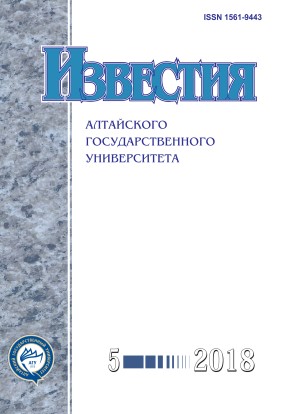The German-Ottoman Alliance and the Propaganda of the Jihad: between Fiction and Reality (1914-1918)
Abstract
The appeal to religious (pseudo-religious) language and symbols was characteristic of all participants of the global conflict which began in 1914. They allowed giving the interstate confrontation a new, "sacred" dimension and, at the same time, historical depth. This happened in the conditions of blurring the boundaries between the religious and non-religious, and was a manifestation of what is now described as the process of sacralization of politics and the politicization of religion. Often, however, there was not a return to tradition, and if to use Eric Hobsbaum's definition, but it's invention. Elements of a similar invention of the tradition can be seen in Ottoman "Great jihad" which promotion in the years of war will become one of the major tasks not only for Ottomans, but also for their German allies. Germans have seen in Islam "new weapon" which can be turned against their enemies.
The formed in Europe by that time ways of perception and description of Islam and Muslims, the rise of Pan-Islamism and a significant number of Muslim subjects among the main opponents of the German Empire (Russia, Britain and France) made such a strategy attractive in their eyes.
The efforts of the Germans and the Ottomans to promote Jihad did not yield the results they expected, but one hundred years after the end of the First World War, this aspect of German-Ottoman cooperation continues to be the subject of study and serious discussions among researchers.
Downloads
Metrics
References
George M. Haddad A Napoleonic Arabic Fragment of Anti-Russian Propaganda in the Ottoman Empire // The Muslim World. — V. 71, № 2. 1981. (DOI:10.1111/j.1478-1913.1981.tb03431.x).
Jihad and Islam in World War 1: Studies on the Ottoman Jihad on the Centenary of Snouck Hurgronje’s «Holy War Made in Germany». Edited by Erik-Jan Zürcher. — Leiden, 2016.
Lüdke T. Strange Fronts, Strange Wars: Germany’s Battle for “Islam” in the Middle East during the First World War, and British Reactions // Joachim Bürgschwentner, Matthias Egger, Gunda Barth-Scalmani, eds., Other Fronts, Other Wars? First World War Studies on the Eve of the Centennial. Brill, 2014.
Khalid A. Pan-Islamism in Practice. The Rhetoric of Muslim Unity and its Uses // Elisabeth Özdalgaed. Late Ottoman Society: The Intellectual Legacy, SOAS / RoutledgeCurzon Studies on the Middle East. — L.; N.Y., 2005.
Raja Adal Constructing Transnational Islam: the East–West Network of Shakib Arslan // Intellectuals in the Modern Islamic World: Transmission, Transformation, and Communication. Edited by Stéphane A. Dudoignon, Hisao Komatsu and Yasushi Kosugi. — L.; N.Y., 2006.
Роган Ю. Падение Османской империи: Первая мировая война на Ближнем Востоке, 1914–1920. — М., 2018.
Hagen G. Die Türkei im Ersten Weltkrieg, Flugblätter und Flugschriften in arabischer, persischer und osmanischtürkischer Sprache aus einer Sammlung der Universität bibliothek Heidelberg eingeleiter, überstzt und kommentiert. — Frankfurt am Main; Bern; N.Y.; P. 1990.
Tim Epkenhans Max von Oppenheim Geld darf keine Rolle spielen: II. Teil, Das Dokument // Archivum Ottomanicum, 19 (2001).
Aksakal M. Holy War Made in Germany? Ottoman Origins of the 1914 Jihad," War in History (April 2011) 18(2). (DOI: 10.1177/0968344510393596)
Kriegsurkunden. Fünf Fatwas osmanischer Geistlicher zur Kriegserklärung des Kalifen // Die Welt des Islams. — Band III. — 1915. — Heft 1.
Kol M. Birinci Dünya Savaşı’nda psikolojik bir operasyon olarak Cihad-ı Ekber ilanı. İstanbul Bilgi Universitesi. Yüksek lisans tezi. — İstanbul, 2017.
Bundesarchiv. Potsdam. Auswärtiges Amt. F 62323.
Enver Pascha Um Tripolis: Feld-Ausgabe. Hugo Bruckmann, Verlag. — München, 1918.
Liman von Sanders O. Funf Jahre Turkei. B., 1919.
Schabiner von Schowingen, K. E. Weltgeschichtliche Mosaiksplitter: Erlebnisse und Erinnerungen eines kaiserlichen Dragomans. — Baden-Baden, 1967.
Aksakal M. The Ottoman Empire // Gerwarth R., Manela E. Empires at War: 1911–1923. — Oxford, 2014.
Izvestiya of Altai State University is a golden publisher, as we allow self-archiving, but most importantly we are fully transparent about your rights.
Authors may present and discuss their findings ahead of publication: at biological or scientific conferences, on preprint servers, in public databases, and in blogs, wikis, tweets, and other informal communication channels.
Izvestiya of Altai State University allows authors to deposit manuscripts (currently under review or those for intended submission to Izvestiya of Altai State University) in non-commercial, pre-print servers such as ArXiv.
Authors who publish with this journal agree to the following terms:
- Authors retain copyright and grant the journal right of first publication with the work simultaneously licensed under a Creative Commons Attribution License (CC BY 4.0) that allows others to share the work with an acknowledgement of the work's authorship and initial publication in this journal.
- Authors are able to enter into separate, additional contractual arrangements for the non-exclusive distribution of the journal's published version of the work (e.g., post it to an institutional repository or publish it in a book), with an acknowledgement of its initial publication in this journal.
- Authors are permitted and encouraged to post their work online (e.g., in institutional repositories or on their website) prior to and during the submission process, as it can lead to productive exchanges, as well as earlier and greater citation of published work (See The Effect of Open Access).








